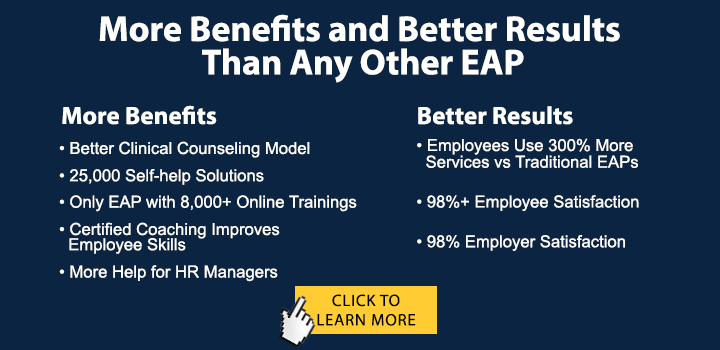While the pandemic has been dominating life in every sphere, it’s vital for HR staff to keep up with changing employment law. We’re offering a roundup of some of the key changes for 2021 and taking a look at issues that may result in legislation over the coming year – particularly with a new presidential administration in place.
Compliance resources: Just as a reminder, ESI is the only EAP to offer a complete curriculum of online compliance and management training programs, with thousands of course modules covering the full range of employee compliance issues, critical employment practice issues, and management training.
- Littler: New State Employment Laws Set to Take Effect on January 1, 2021- “Compared to prior years, there are significantly fewer new laws and regulations taking effect the first of the year. This is likely because state legislatures focused on emergency pandemic-related laws while in session. Nonetheless, employers will still face many new obligations in the months ahead….See the chart and links below for access to summaries of several employment-related laws taking effect in 2021. Please note that the below list includes generally applicable laws taking effect in states and some large municipalities. It is not an exhaustive list, and may not necessarily include laws applicable to your particular industry.”(Minimum wage laws below)
- Insperity: Employment law changes to watch in 2021 – “This year, many states have enacted changes in employee leave policies; ended or extended some temporary exemptions put in place due to the coronavirus pandemic; and taken steps to improve diversity, equity and inclusion in the workplace. Here are some of the major changes we’re following. All these employment law changes are effective Jan. 1, 2021 unless otherwise noted.”
- Jackson Lewis: The Year Ahead for Employers 2021 (PDF) – A 48-page publication which “details trends, legislation, regulation and litigation nationwide to help employers know what to expect in the coming months.”
Minimum wage
- Littler: Minimum Wage, Tipped and Exempt Employee Pay in 2021: A Rates-Only Update – Minimum wage laws can affect businesses of all sizes, whether operating nationwide, in multiple jurisdictions, or only in one state, county, or city. To help manage this challenge, below we provide a rates-only update that details scheduled state- and local-level wage increases throughout 2021 so employers can determine the minimum amount they must pay non-exempt, tipped, and certain exempt employees. Before we chart out the 2021 rates, however, we briefly highlight rate changes that occurred in fall 2020, November 2020 ballot measures, and a unique 2021 issue in New Mexico.
- HR Daily Advisor: State Minimum Wage Increases for 2021 (Map) – Under the Fair Labor Standards Act (FLSA), the current federal minimum wage is $7.25 per hour, but the FLSA does not supersede any state or local laws that are more favorable to employees. Therefore, if a state or municipality has a minimum wage that is higher than the federal minimum, employers subject to the state or local minimum wage law are obligated to pay the higher rate to employees working there. The minimum wage for federal contractors in 2021 is $10.95 per hour.
- ADP: Exempt Employees: Minimum Salary Requirements for 2021 – The federal Fair Labor Standards Act (FLSA) requires employers to pay most employees at least the federal minimum wage for each hour worked as well as overtime pay for all hours worked in excess of 40 in a workweek. The FLSA allows for exemptions from these overtime and minimum wage requirements for certain employees who work in administrative, professional, and executive jobs (known as “exempt” employees).
- US DOL: State Minimum wages
Call for a $15 minimum
- HR Daily Advisor: Biden’s Call for $15 Federal Worker Minimum Wage Seen as Signal of Things to Come
- Jon Hyman: What employers can expect from Biden’s presidency: A $15 minimum wage
- HR Daily Advisor: Employers Likely to Seek Exceptions in $15 Minimum Wage Bill
Other anticipated employment law initiatives under the Biden administration
With every new administration, the employment law ground shifts. The Biden administration will be a marked change from the Trump administration, evident in both campaign promises and the first week in office. Expect this administration to be more favorable to unions, workplace safety, enforcement of discrimination laws, strengthening of the Affordable Care Act, raising the federal minimum wage to $15, immigration policies that affect employment, independent contractors, and more. Here’s a roundup of what some expert observers see ahead:
- Littler: What to Expect in Labor and Employment Law Under the Biden Administration
- Jackson Lewis: The Future of Workplace Law Under President-Elect Joe Biden
- Williams Mullen: Labor, Employment and Immigration Law Changes to Expect from the Biden Administration
- HR Daily Advisor: Biden Administration Will Bring Big Changes to DOL
- SHRM: DOL Priorities Will Change Under Biden Administration
- HR Daily Advisor: Workplace Issues a Biden Administration May Tackle, Stay Tuned
- HR Daily Advisor: Employers Hoping for Stability as Biden Immigration Plan Unveiled
Helpful Employment Law Resources
- Summary of the Major Laws of the Department of Labor
- State Labor Offices – Commissioners, Directors, and Secretarie
- Disability Management Employer Coalition (DMEC) Legislative Updates
- EEOC Announces 2021 Schedule for EEO Data Collection
- State Sexual Harassment Training Requirements
- NCSL: State Medical Marijuana Laws


